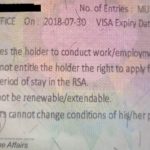The United States recognizes that African countries face real security concerns, and that countless communities are afflicted by the twin scourges of terrorism and violence. But the answer to those problems is not Wagner, it’s not any other mercenary group. The answer is working to build more effective, accountable African security forces, which respect people’s rights, and tackling the marginalization that often drives people to criminal or extremist groups. The answer is sustained diplomacy to end violence and open paths to peace – diplomacy that’s increasingly being led by African leaders, regional organizations, and citizens.
African countries can count on the United States to support these efforts – as we’ve demonstrated through our engagement in places like Chad, Ethiopia, Sudan, eastern DRC – which is a key focus of my visit this week.
Finally, the answer is peaceful transitions of power, through free and fair elections. African leaders are increasingly underscoring the importance of these transitions to regional security and prosperity. That includes ECOWAS, which is debating whether its 15 member nations should adopt a ban on presidents seeking a third term. Among the most outspoken proponents of the ban are the presidents of Ghana and Nigeria, both of whom are in their second term.
This week, Kenyans will elect a new leader, and Angolans will follow suit later this month. In 2023, the peoples of the Democratic Republic of the Congo, Nigeria, and Senegal will all go to the polls. Every one of these elections is an opportunity for African citizens and nations to reaffirm that leaders are accountable to their people, and strengthen the case for democracy in the region and around the world.
Third, we’ll work together to recover from the devastation wrought by COVID-19 and lay the foundation for broad-based, sustainable economic opportunity to improve the lives of our people.
We know the pandemic has dealt a devastating blow to Africa – lives lost, livelihoods shattered. More than 55 million Africans have been driven into poverty by the pandemic, setting back decades of hard-earned progress. The economic pain has been deepened by Russia’s unprovoked war on Ukraine.
Even before President Putin launched his full invasion, 193 million people worldwide were in need of humanitarian food assistance. The World Bank believes that Russia’s invasion could add another 40 million people to this unprecedented number. Most are in Africa.
The United States is there for African countries in this unprecedented crisis, because that’s what partners do for each other, and because helping Africans jumpstart a broad-based recovery and build resilience to weather future shocks is vital to our shared prosperity.
So let me briefly share how we’re doing that. We’re rallying other countries and international institutions to step up on key challenges, like debt relief. Together with South Africa and other members of the G20, we helped develop a Common Framework for Debt Relief, bringing in China and other creditors for the very first time. For Zambia, this collective commitment is poised to unlock $1.4 billion in an IMF program designed to help the country return to a stable economic path and foster more resilient, inclusive growth for the Zambian people.
We’re also providing life-saving support. Since the beginning of the year, the United States has sent more than $6.6 billion in humanitarian and food assistance to Africa.
Continued next page
(150 VIEWS)

